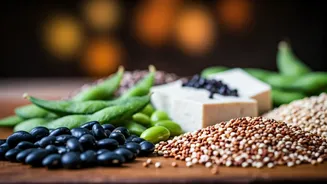Protein's Crucial Role
Protein is a building block for every cell in your body, so it’s essential to consume enough of it to thrive. It supports muscle growth and repair, crucial
for physical activity. Additionally, it helps create enzymes and hormones which are important for bodily functions, playing a vital role in maintaining overall health. Insufficient protein consumption can lead to muscle loss, weakened immune function, and various other health problems. Hence, understanding protein sources and how to incorporate them effectively into your diet is vital, especially for vegetarians who need to consciously source their protein from non-animal foods.
Soy's Protein Power
Soy products, like tofu, tempeh, and edamame, are a cornerstone of vegetarian protein. Tofu, often called bean curd, is very versatile, absorbing flavors well and serving as a base for various dishes. Tempeh, made from fermented soybeans, has a slightly nutty flavor and a firm texture, making it ideal for stir-fries and sandwiches. Edamame, the young soybeans, offers a satisfying snack and can also be added to salads or eaten as a side dish. Soybeans are considered a complete protein, offering all nine essential amino acids the body needs, making them a top pick for vegetarians aiming for a balanced diet. Incorporating these foods into your diet boosts your protein intake while allowing you to enjoy a variety of culinary styles.
Lentils: A Staple Choice
Lentils are an excellent protein source and a pantry staple for vegetarians, offering a hearty and filling ingredient for many dishes. They're a nutritional powerhouse, rich in protein and fiber, making them ideal for managing blood sugar levels and promoting digestive health. There are many kinds of lentils, like green, brown, and red, each with its own cooking characteristics. They are budget-friendly, easy to prepare, and can be used in soups, stews, salads, and curries. A cup of cooked lentils provides a significant amount of protein, along with other essential nutrients, offering a complete protein and a simple way to boost your daily protein intake.
Quinoa's Advantages
Quinoa, often referred to as a pseudocereal, is a complete protein, meaning it contains all essential amino acids, which is a rare feature for plant-based foods. It's also gluten-free, making it an excellent alternative to wheat-based grains. It's high in protein, fiber, and iron, offering significant health benefits. Quinoa can be cooked like rice, making it a versatile ingredient in various recipes, like salads, bowls, or as a side dish. Its mild flavor complements many other ingredients, making it easy to incorporate into your meals. Adding quinoa to your diet offers a nutritious and flexible way to meet your protein needs and enjoy a variety of delicious dishes.
Nuts and Seeds
Nuts and seeds are great for providing plant-based protein, making them an excellent snack or meal addition. Almonds, cashews, pumpkin seeds, and chia seeds contribute to your protein intake and provide healthy fats, fiber, and other essential nutrients. A handful of almonds offers a protein boost and can be added to trail mixes, salads, or oatmeal. Seeds like chia and flax seeds can be sprinkled on yogurt or added to smoothies to boost both protein and fiber. Although they have fewer protein grams compared to other sources, their nutritional profile makes them essential for a balanced vegetarian diet. They also provide versatility for snacking and cooking.
Protein Intake Strategies
To fulfill your protein needs as a vegetarian, you need a mindful approach. Focus on including a variety of protein-rich foods throughout the day, like the ones mentioned earlier. Combining different plant-based protein sources, for example, beans with rice, helps create complete protein profiles, ensuring you get all necessary amino acids. Pay attention to portion sizes and plan your meals in advance to guarantee sufficient protein intake. Using a food tracker app can help you keep track of your daily protein intake and identify any potential gaps. Ensuring adequate protein intake is achievable by following a well-planned vegetarian diet, contributing to overall health and well-being.













